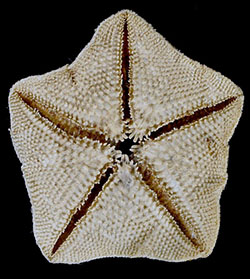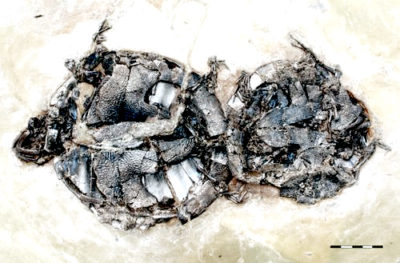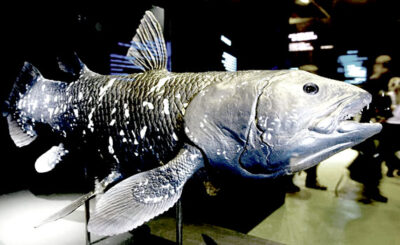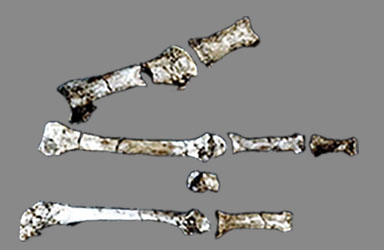by Richard William Nelson | Jul 24, 2012
 Deciphering evidence for sea star evolution has long intrigued biologists. To explore speciation between two similar-looking sea stars, Jonathan Puritz (pictured below) of the Institute of Marine Biology at the University of Hawaii coordinated a research team to correlate the genetic and geographic differences between two Coral Sea species.
Deciphering evidence for sea star evolution has long intrigued biologists. To explore speciation between two similar-looking sea stars, Jonathan Puritz (pictured below) of the Institute of Marine Biology at the University of Hawaii coordinated a research team to correlate the genetic and geographic differences between two Coral Sea species.
The team’s report, entitled “Extraordinarily rapid life-history divergence between Cryptasterina sea star species,” was published last week in the Proceedings of the Royal Society.
Continue Reading
by Richard William Nelson | Jun 26, 2012
 Clues from fossilized mating turtles (pictured left) point to an enormous and sudden geological event. In last week’s edition of Biology Letters published by the Royal Society, Walter Joyce (pictured right) of Geosciences at the University of Tübingen in Germany.
Clues from fossilized mating turtles (pictured left) point to an enormous and sudden geological event. In last week’s edition of Biology Letters published by the Royal Society, Walter Joyce (pictured right) of Geosciences at the University of Tübingen in Germany.
The letter, entitled “Caught in the act: the first record of copulating fossil vertebrates,” updates information on the fossilized turtles discovered 30 years ago.
ABC News, BBC News, National Geographic, New York Daily News, MSNBC, FOX News, and Nature and Science journals featured the story, an unprecedented finding.
Continue Reading
by Richard William Nelson | May 29, 2012
 The search for an explanation for the origin of life started long before the publication of Charles Darwin’s Origin of Species in 1859. The first naturalistic theory of life arising from non-life, known as spontaneous generation, is attributable to Aristotle and ancient Greek philosophy.
The search for an explanation for the origin of life started long before the publication of Charles Darwin’s Origin of Species in 1859. The first naturalistic theory of life arising from non-life, known as spontaneous generation, is attributable to Aristotle and ancient Greek philosophy.
Darwin rejected the Genesis account of creation written by Moses. Lingering doubts over the origins of life, however, forced Darwin to reject atheism and embrace agnosticism –
“The mystery of the beginning of all things is insoluble by us, and I, for one, must be content to remain an Agnostic.”
Continue Reading
by Richard William Nelson | May 22, 2012
 Andrew J. Wendruff and Mark V. H. Wilson of the University of Alberta added a new dimension to the ongoing coelacanth saga this week in the paper “A fork-tailed coelacanth, Rebellatrix divaricerca,” published in the Journal of Vertebrate Paleontology.
Andrew J. Wendruff and Mark V. H. Wilson of the University of Alberta added a new dimension to the ongoing coelacanth saga this week in the paper “A fork-tailed coelacanth, Rebellatrix divaricerca,” published in the Journal of Vertebrate Paleontology.
In the paper, Wendruff and Wilson present a newly discovered coelacanth species found surprisingly on the rocky slopes of the Canadian Rockies, British Columbia.
The species named Rebellatrix divaricerca means “rebel coelacanth (with a) forked tail.” Far different from today’s Indian Ocean coelacanths, these ancient rebel fast-swimming predators further undermine attempts to develop a cohesive coelacanth evolution saga.
Continue Reading
by Richard William Nelson | Apr 3, 2012
 The sequence of biological events leading to hominin locomotion has long intrigued evolution scientists.
The sequence of biological events leading to hominin locomotion has long intrigued evolution scientists.
Last week, the journal Nature reported on a hominin-like foot discovered in Eastern Africa.
Entitled “A new hominin foot from Ethiopia shows multiple Pliocene bipedal adaptations,” the finding raises questions about the evolution of hominin locomotion.
Continue Reading
 Deciphering evidence for sea star evolution has long intrigued biologists. To explore speciation between two similar-looking sea stars, Jonathan Puritz (pictured below) of the Institute of Marine Biology at the University of Hawaii coordinated a research team to correlate the genetic and geographic differences between two Coral Sea species.
Deciphering evidence for sea star evolution has long intrigued biologists. To explore speciation between two similar-looking sea stars, Jonathan Puritz (pictured below) of the Institute of Marine Biology at the University of Hawaii coordinated a research team to correlate the genetic and geographic differences between two Coral Sea species.
 Clues from fossilized mating turtles (pictured left) point to an enormous and sudden geological event. In last week’s edition of
Clues from fossilized mating turtles (pictured left) point to an enormous and sudden geological event. In last week’s edition of  The search for an explanation for the
The search for an explanation for the  Andrew J. Wendruff
Andrew J. Wendruff The sequence of biological events leading to hominin locomotion has long intrigued evolution scientists.
The sequence of biological events leading to hominin locomotion has long intrigued evolution scientists.